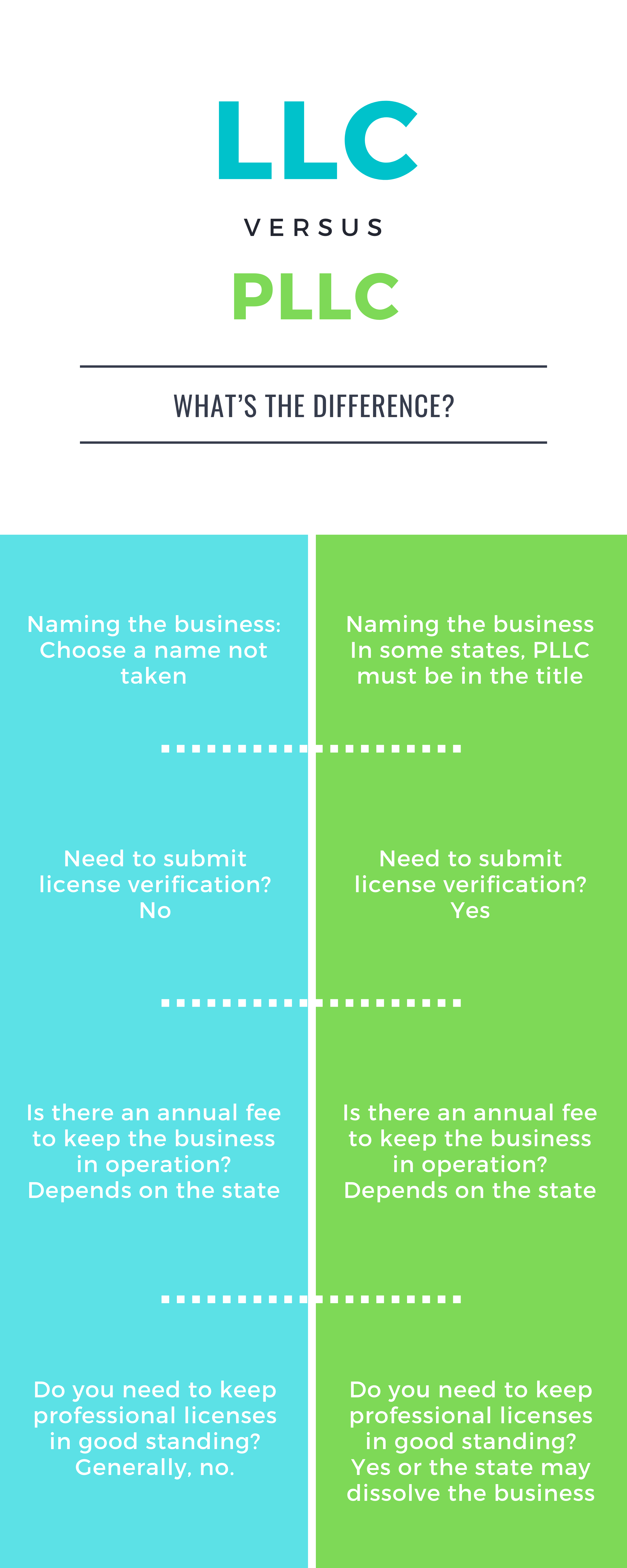For the person starting a business, an alphabet soup of organizational forms awaits. Over the last two decades, the limited liability company, or LLC, has become one of the most popular ways to categorize one’s business. But there are important things to understand about the LLC and its cousin, the professional limited liability company, or PLLC, before diving in. Let’s consider their key attributes and significant differences, so you can find out what kind of organization is right for your business.
What is an LLC?
Limited liability companies have been in existence since 1977, first emerging in Wyoming.1 They came about to combine the benefits of two different kinds of business entities: the corporation and the partnership. Historically, the main benefit of forming a corporation has been limited liability. This means that in the event something happens and the corporation is facing legal liability, such as from an on-the-job accident caused by one of its employees, only the assets of the corporation, not its owners, could be used to settle the debt.2
Partnerships didn’t have this protection: The personal assets of partners could be reached in a lawsuit. Partnerships, however, do have advantages for federal income tax. Money earned in a partnership is only taxed once. But in many corporations, money can be taxed twice, once when the corporation “earns” it, and again when the individuals who own the corporation collect salaries or dividends.3 The benefits of combining pass-through taxation, as it is known, with limited liability, proved attractive, and all states now allow some type of LLC, and in many jurisdictions, there are more LLCs created each year than corporations.4
What is a PLLC?
Even though all states now allow LLCs, there are differences among them in what kind of businesses they allow to use the form. Particular issues arise with regard to whether professionals, meaning those requiring a license from the state in which they operate, can form an LLC.
Revised Uniform Limited Liability Company Act
In 2006, the National Conference of Commissioners on Uniform State Laws (NCCUSL) released the Revised Uniform Limited Liability Company Act. Those may sound like complicated acronyms, but NCCUSL was really just trying to come up with a model law that states could adopt to govern the formation and operation of LLCs, and its approach has been highly influential. Among its many provisions, it says that “a limited liability company may have any lawful purpose, regardless of whether for profit.”4 Many states have either adopted the uniform act outright, or shaped their own laws to resemble it, but it doesn’t mean that any kind of business can be an LLC. Instead, “lawful purpose” means that a state gets to decide which sorts of businesses get to use the LLC form.4
Professional Licenses and PLLCs
Many states have decided that “professions” cannot use the LLC form. Professions, because of the license they receive from the state, may be seen by the public as deserving of trust and less in need of scrutiny, and giving these businesses the same limited liability as LLCs could be harmful to customers. This is especially true in the case of professions like doctors, lawyers, and accountants, who are held to particular standards and can usually be sued for malpractice if their work falls short of these standards.5 As a result, another entity has arisen: the PLLC.
In most states, PLLCs keep the federal income tax benefits of an LLC, and have some, but not all, of the limited liability benefits of a traditional corporation.6 Imagine, for example, that a group of doctors forms a PLLC in one of these states, and one of the doctors makes a serious error during surgery. That member of the PLLC can still be sued personally for malpractice, meaning he or she could lose money beyond what was invested in the PLLC; but if the patient were to sue the PLLC as well, the other members would be potentially liable only for the amount they invested.7
Should I Form a PLLC?
In many instances, if your business is licensed by the state, the answer is yes, but California notably has no PLLC option.8 The state has attempted to distinguish between “occupational” licenses and other professional licenses by looking at the “educational, training, and testing prerequisites.”9 The idea is that the concerns over liability of professions with a lot of training, like doctors and lawyers, don’t necessarily apply to every field that needs a license, of which there are literally hundreds. Some businesses that are required to obtain a license from the state may still form LLCs, while others must choose another form entirely, such as a Professional Corporation, or Limited Liability Partnership. There is a lengthy list of professions that definitely cannot form an LLC in California, but it is not necessarily exhaustive.10 Determining if your particular business qualifies can be a difficult, situation-dependent question to answer, and may require consulting with an attorney.
Forming an LLC vs. a PLLC

LLC and PLLC Similarities
There is a lot of overlap to forming an LLC or PLLC. Both require:
- choosing a name for the company that is not already taken by another;
- selecting a registered “agent” to be the person to receive communications on behalf of the company; and
- filing articles of organization with the secretary of state’s office in the state where you want the company to be based.
(When it comes to naming, PLLCs often have to contain “PLLC” in the title.) And in both types of organizations, it’s a good idea to draw up an operating agreement. This agreement may not need to be submitted to the secretary of state, but instead sets out how ownership of the company is divided, and how decisions will be made. If you don’t have an operating agreement and a dispute arises, your LLC or PLLC will be subject to the default state law provisions.11
LLC and PLLC Differences
There are two key differences to keep in mind. One is that PLLCs often have to submit verification of the status of their license along with their articles of organization, and file a document with the state body that granted them their license; in some states, the organization must wait for approval from the licensing board before organizing the PLLC.12 The other issue involves dissolution. While LLCs and other business entities are generally presumed to exist in perpetuity once created, PLLCs may be automatically dissolved if all of the members lose their licenses.13 Because some professional licenses require periodic or annual renewal fees or can be suspended for failure to keep up with continuing education requirements, it’s a good idea to discuss keeping up with license requirements ahead of time, or even putting a provision about it in the operating agreement.
Video
Sources
- https://kb.osu.edu/bitstream/handle/1811/65040/OSLJ_V59N5_1459.pdf
- https://scholar.law.colorado.edu/cgi/viewcontent.cgi?referer=https://scholar.google.com/&httpsredir=1&article=1934&context=articles
- https://kb.osu.edu/bitstream/handle/1811/65040/OSLJ_V59N5_1459.pdf
- https://users.wfu.edu/palmitar/ICBCorporations-Companion/Conexus/UniformActs/ULLCA2006.pdf
- https://www.upcounsel.com/professional-limited-liability-company
- https://www.legis.iowa.gov/docs/publications/iactc/82.2/CH1162.pdf
- https://www.bia.gov/
- http://leginfo.legislature.ca.gov/faces/codes_displaySection.xhtml?lawCode=CORP§ionNum=17701.04
- https://oag.ca.gov/system/files/opinions/pdfs/04-103.pdf
- http://leginfo.legislature.ca.gov/faces/codes_displayText.xhtml?lawCode=CORP&division=3.&title=1.&part=4.&chapter=&article=
- https://www.nolo.com/legal-encyclopedia/form-llc-how-to-organize-llc-30287.html
- https://www.citybarjusticecenter.org/wp-content/uploads/2016/09/CBJC-NELP-PLLC-Formation-Fact-Sheet.pdf
- https://www.legis.iowa.gov/docs/publications/iactc/82.2/CH1162.pdf
